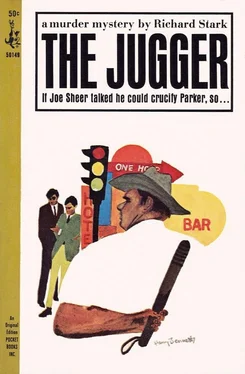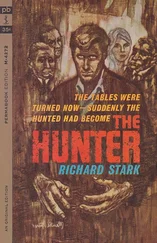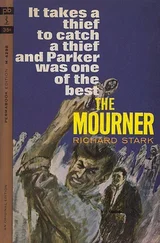Which meant Captain Younger was headed this way, no question.
Parker wanted to talk to the captain, wanted to find out what the captain was trying for, but not yet. There was still more to be done first.
He got to his feet and said, “Well, I won’t keep you. You must be busy.”
“Not at all, not at all.” The doctor struggled out of the chair, trying to look casual, saying, “I have plenty of time, office hours don’t begin till two.”
“I have to get back to the hotel,” Parker told him, and started walking towards the front door.
The doctor trotted after him. “I haven’t even offered you coffee yet. Or a drink? Surely you can spare ten minutes, I’d love to talk with you about Joe Shardin, a fine old man, there really can’t be any reason for you to rush away, you just barely got here, we’ll have a drink and...”
Parker opened the door. “Maybe I’ll come back when I’ve got more time,” he said. He looked at the doctor, who was blinking and looking winded, and still trying to be casual. “We’ll have a lot to talk about,” Parker told him. “Some other time.” He stepped out onto the porch and let the door close behind him.
When he was a block away he looked back and saw the black Ford pulling to a stop in front of the doctor’s house. But then he turned the corner and didn’t see what happened next.
It was a smallish white clapboard house on a narrow lot in the middle of the block, flanked on both sides by houses larger than itself, but with vacant lots and fields and unfinished streeting in the block behind it. There was a driveway in from the street, running beside the house, but no garage. A gnarled apple tree stood in the middle of the back yard.
Parker had come the front way the last time, and by night. This time he was coming the back way, by day, walking across the scrubby weedy fields with his hands tucked deep in his coat pockets and his shoulder hunched against a cold breeze blowing across from his left. He came in at an angle, so he could see past the apple tree to the blank, black rear windows of the house and along the driveway to the curb out front. No face showed in the windows, and no car was parked at the curb.
In retirement, Joe had gone the whole way, even getting interested in the things retired types were supposed to be excited about, including gardening. The back yard was half lawn and half flower garden, broken up into alternative squares of each like a checkerboard, with a red slate walk meandering through it and around the apple tree and eventually to the back porch, a narrow affair with three creaking steps. A milk-company box stood on this porch, along with a broom, two empty beer cases, and a hoe. A clothes-line pulley hung from a hook on one of the porch uprights, but there was no clothes-line attached to it.
The screen door was unlocked, but the inner door wasn’t. Parker tried the knob, then tried leaning on it a little, then stood and considered it a few seconds. He’d brought no tools along, nothing at all, not expecting to have to work.
There was no point fooling with it. He held the screen door open, raised his right foot, and slammed the flat of his heel into the door just above the knob. It made a hell of a racket, and the glass in the door trembled as though thinking about breaking. The second time Parker kicked it, the door gave up and opened, springing back so far and so hard it slammed into the wall. Parker stepped in, latched the screen door, and shut the door again. It wouldn’t close all the way, but good enough.
He was in the kitchen, a small square room with green-checked linoleum on the floor and chintz curtains over the windows. The refrigerator was small and old and had been repainted; Parker could see the brush marks from across the room. The small wooden table and the sideboard were both clean, but in the sink were one plate, one set of silverware, one coffee cup, and two glasses. Parker opened the refrigerator and found it still working; so the electricity had never been turned off. That was stupid. The refrigerator contained some TV dinners, some hot dogs and hamburgers, a head of lettuce, an opened bottle of milk, a few twelve-ounce bottles of beer, and a quarter-pound stick of butter.
Parker shut the refrigerator door again and looked around the room. What was he looking for? He didn’t know himself, exactly; just something to tell him what was going on, something to tell him how Joe had died, who had helped him if he had been helped, and what Captain Younger was up to. There might not be anything here at all, but it was the first place he should look.
He searched the rest of the kitchen and found only the stuff you’d expect to find in a bachelor’s kitchen. He was all finished and ready to start on another part of the house when he remembered something. He got a table knife from the silverware drawer, took down the flour canister from its shelf, and took the top off. He poked the knife down into it, poked and pried around, and there wasn’t anything in there but flour.
That wasn’t right. There should have been a tobacco pouch down in there, with twenty fifty-dollar bills rolled in it; Joe Sheer’s run-out money. He’d kept it there just in case he ever had to leave here too fast to close out bank accounts, and a couple of years ago he’d mentioned to Parker where he had it stashed.
Now it was gone, and it didn’t make any sense for it to be gone. There was no sign anywhere around that anybody else had searched this place, which meant it wasn’t taken by somebody just stumbling on it but by somebody who knew it was there all along. Who else could that be but Joe Sheer? But if Joe had taken that money, five minutes later he’d have been out of town; the thousand bucks in the flour canister was getaway financing exclusively, not to be used for anything else.
Parker put the canister back where it belonged, washed the flour from the knife, dried the knife and put it away again in the silverware drawer. Then he left the kitchen, going through a doorway that led to a central hallway about six feet long. Every room in the house led off this hallway; living room, two bedrooms, bathroom, kitchen. The cellar stairs were off this hallway, and a trap-door in the hallway ceiling led to the narrow cramped attic.
Parker went into the living room next. It was a small room, made to look even smaller because of the bulkiness and darkness of the furniture. Joe Sheer had liked an older style of furniture, the kind of heavy round stuff that went with tasselled lamp shades and fringed shawls. Parker stood just inside the doorway and looked around, and the room looked no different from the last time he’d been here. There was a new television set, but it was in an old-style cabinet that blended in well with the furniture already there.
Looking around the room, Parker happened to see the thermostat on the wall near the front door, and it occurred to him that the house was warm. He hadn’t paid any attention to that when he’d first come in, because it only seemed natural that the house should be warm; but it wasn’t natural at all. This house was supposed to be empty now, was supposed to have been empty for the last two or three days. Somebody should have come along by now to shut the place up.
He went over and looked at the thermostat. It was set for seventy, and the little thermometer on it read the same. So the furnace was still going, and the electricity was still turned on.
And the phone?
It was over on a rickety-looking end table next to the sofa. Parker went over and picked it up and listened for a second to the sound of the dial tone. It was still working.
He hung up the phone and looked around at the room. Somebody wanted this place to stay liveable, and he didn’t know why.
He couldn’t get a corner on it, not a corner.
Читать дальше












